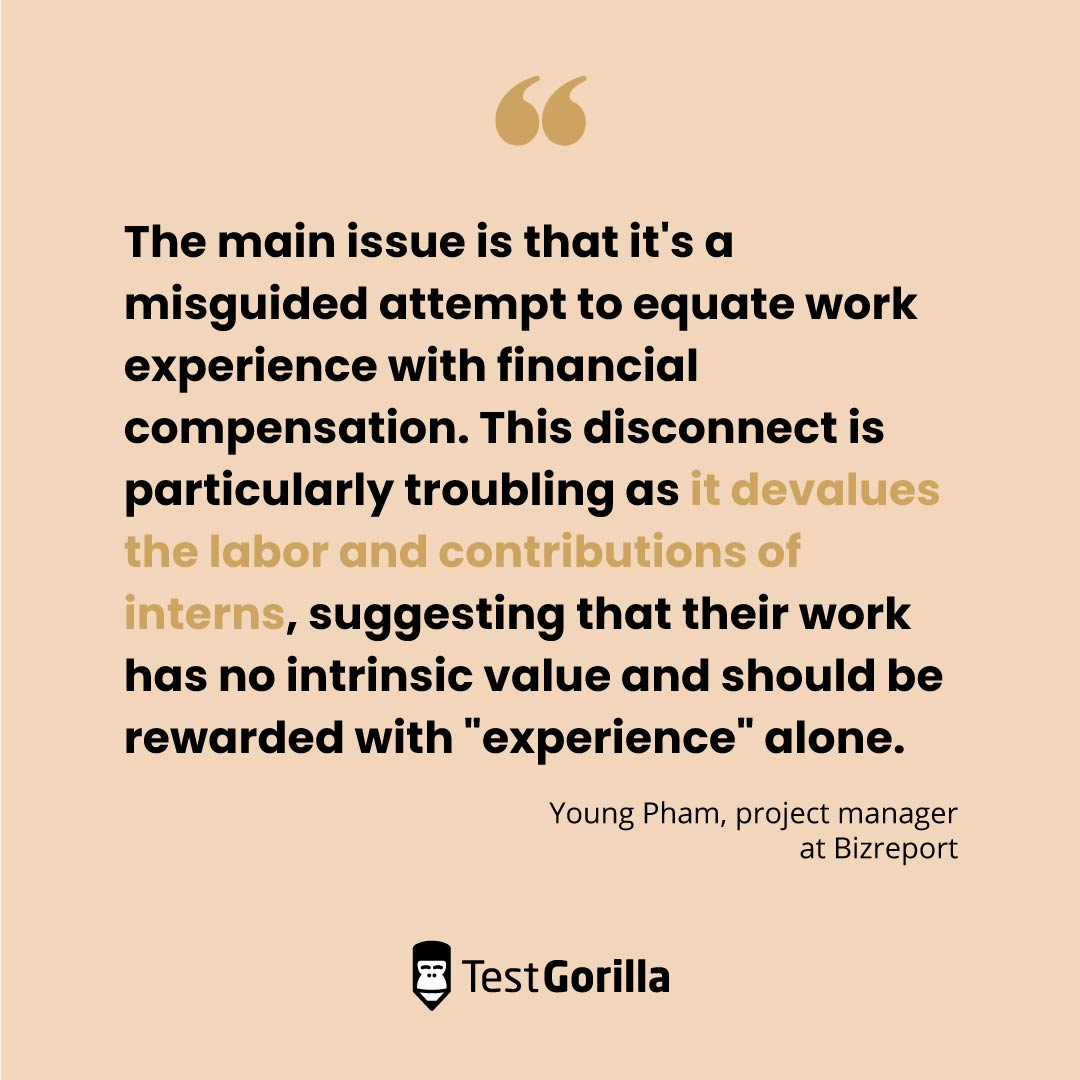Your growing SaaS startup is at a pivotal point: You need to start thinking about ethically hiring interns to help support your business's growth. You also want to nurture and empower the next generation of talent in a responsible and socially conscious manner. To do this, you know you need a new way of testing and measuring skills that goes beyond traditional, unequal hiring practices like relying on resumes, connections, or degrees.
Internship programs can effectively support your teams and give you access to talented individuals with a positive growth mindset. However, many businesses take advantage of people looking for a chance to advance their burgeoning careers, using them as little more than unpaid labor. In this article, we'll look at the nature of exploitative internship practices and their consequences. Then, we’ll make the case for responsible internship programs and outline how a skills-focused approach can positively impact your organization – and the experiences and career prospects of your interns.
Why are unpaid internships exploitative?
According to Young Pham, project manager at Bizreport: "Unpaid internships take advantage of the eagerness of young and aspiring professionals to gain relevant work experience and establish a foothold in their chosen industries."
From profiting from unpaid work to contributing to a system of inequality, here's how unpaid internships take advantage of aspiring professionals.
It’s exploitative for an employer to profit from unpaid work
"The main issue is that it's a misguided attempt to equate work experience with financial compensation. This disconnect is particularly troubling as it devalues the labor and contributions of interns, suggesting that their work has no intrinsic value and should be rewarded with "experience" alone." says Pham.
Meeting the demand for these opportunities with a supply of unpaid positions lets employers use interns for their work and ideas while giving them very little in return, otherwise known as exploitation.
This also undermines the incentive for other companies to offer fair compensation for labor. Suddenly, saving on labor costs and increasing profits at the expense of unpaid talent begins to look more attractive.
Moreover, when internships offer college credit instead of financial compensation, it's essential that they're structured to prioritize the educational experience of the student and align with their academic goals.
When internships meet these criteria, they can provide valuable opportunities for students to gain hands-on experience, build skills, and make meaningful connections in their chosen field. However, when they lack educational value and resemble unpaid labor, they can also be considered exploitative.
The consequences of exploitative business practices
Unpaid internships can create significant barriers for those who can't afford to take on unpaid roles. This excludes talented individuals from diverse socioeconomic backgrounds, limiting opportunities to start their careers at companies that align with their professional goals. Moreover, it perpetuates a hiring cycle of inequality, nepotism, and reliance on connections, which can negatively impact output and employee morale.
Without diverse talent, it's likely you'll have a stagnant work culture that lacks varied and interesting perspectives and therefore, solutions.
Additionally, many internships are offered through university programs, which excludes skilled by alternative route (STAR) candidates, including minority groups like disabled people, Black and Indigenous people of color (BIPOC), and women. Without opportunities to build up large networks and access to these entry-level positions, it's harder for underrepresented groups to get their foot in the door, making it difficult for companies to develop diverse leadership and teams.
Interns vs employees and trainees: What’s the difference?
Interns, employees, and trainees represent different categories of workers. However, these distinctions can vary depending on the organization's policies and country's labor regulations:
Interns participate in temporary programs for hands-on learning in a specific field, may be paid or unpaid, and focus on skill development.
Employees are part of the permanent or long-term workforce, are regularly compensated, and contribute to the organization's core functions.
Trainees receive specialized training within an organization to learn or enhance specific skills, often receive compensation, and engage in temporary, skill-focused programs.
For example, in the US, the Fair Labor Standards Act (FLSA) stipulates the legal requirements for compensation for employees, including paid interns. Additionally, EU labor laws and regulations ensure that employees are entitled to fair wages, benefits, and employment rights. In many EU countries, interns are entitled to a stipend or remuneration, however, it's typically lower than regular employee salaries.
6 benefits of ethical internship programs
Done right, internship programs can offer the hands-on experience people need to determine a career path, develop necessary skills, and understand if it's the right industry and role for them.
Ethical internship programs, where the intern is subject to minimum wage requirements and employment standards, are the way forward for creating a diverse culture people truly want to be part of.
Here are six more benefits to ethical internship programs:
1. Skills development and training
In ethical internships with a strong focus on skills development and growth, interns can apply what they've learned in a classroom or academic setting to real-world situations – bridging the gap between theory and practice. This practical application helps them understand how their skills are used in a professional context, while giving them the opportunity to advance their knowledge and skills.
Additionally, internships often include specialized training tailored to the organization's industry or specific job roles. This training can be difficult to obtain through traditional educational channels, giving interns more access to job-specific expertise and in-demand skills.
2. Adds capabilities to your team
Ethical internship programs can be designed to address specific skill gaps identified within your company. By using talent assessment software, you can conduct a comprehensive skills gap analysis that helps determine which areas need strengthening and aligning intern roles accordingly.
Since interns are often eager to learn and contribute, they can also take on tasks, especially those related to routine or time-consuming work, which can free up experienced team members to focus on more strategic and high-value tasks.
Moreover, interns from different backgrounds can help diversify your team, which can be beneficial in understanding and serving a broader customer base and can improve the team's overall problem-solving abilities.
3. Helps social mobility
Ethical internships select candidates based on merit and potential, rather than personal connections or financial means. This helps level the playing field for talented individuals who may not have had previous opportunities due to lacking a four-year college degree or multiple unpaid internships on their resume.
With adequate financial compensation and stipends, ethical internships are also more accessible for individuals from lower-income backgrounds, meaning they can participate without the burden of unpaid labor. This can give them more opportunities in your company and the workforce in general, which helps promote social mobility and increase diversity in representation.
Interns also have the chance to network with professionals and establish valuable connections within their chosen industry. These connections can help individuals from disadvantaged backgrounds access job opportunities and mentorship that might otherwise be out of reach, and keep a culture of diversity and inclusion within the company.
4. Good for your reputation
Organizations that hire interns ethically can enhance their reputation as socially responsible and ethical employers, which can attract top talent. This is especially important considering six in 10 Gen Zs and Millennials believe businesses have no ambition beyond wanting to make money and will prioritize those that value DE&I and having a positive societal impact.[1]
5. Build a long-term talent pipeline
A strong internship program lets you identify and nurture potential future employees, and build relationships with skilled people you want to work with long-term.
By having the opportunity to develop industry-specific skills and become familiar with your organization's processes and tools, onboarding interns can also significantly reduce the learning curve when they transition into full-time roles. This gives you access to a steady talent pipeline that takes less time to train and is, therefore, more prepared to do their best work.
6. Helps loyalty and engagement
Employees who first got their opportunity as interns with little or no experience can be more likely to be loyal, engaged employees who are culturally aligned with the organization. This is because past interns already understand your organization's culture, values, and mission. This makes them a natural culture fit for long-term employment and reduces the risk of hiring someone who may not align with the company's ethos.
Additionally, past connections and friendships at the company can continue as interns become full-time employees, fostering a sense of camaraderie, teamwork, and ultimately, engagement.
The best insights on HR and recruitment, delivered to your inbox.
Biweekly updates. No spam. Unsubscribe any time.
How skills-based hiring helps you hire top interns
Now that you know the benefits of ethical internship programs, here are four ways skills-based hiring helps you create fairer and more equitable internships – and gets you in front of the best talent.
1. Select interns for their skills and capabilities
Skills-based hiring involves testing candidates on their applied skills and abilities before they start interviewing, giving you more time to get to know potential interns who have what it takes. This way, you can select interns based on the skills you identify your business needs, and close any skills gaps.
Moreover, a skills-based approach to recruiting gives interns more options to switch roles down the line, which can get you skilled talent from a wide range of departments, roles, and industries. Because talent mobility is significantly hindered by resume screening, skills-based hiring lets people be more creative in how they approach job and internship searching. This gives them confidence that they'll have in-demand transferable skills over formal qualifications or experience that don't necessarily predict job success.
"Skills-based hiring focuses on capabilities rather than credentials. This evens the playing field, enabling us to identify top interns based on what they can do, rather than where they studied or who they know, thus making talent acquisition and retention more effective." Lou Reverchuk, chief executive at EchoGlobal.
The State of Skills-Based Hiring 2025
Read TestGorilla's annual report to discover why 85% of companies are choosing skills-based hiring s in 2025.
2. Measure potential for professional development
With skills-based testing, you can measure interns' hard, soft, and transferable skills as well as how they're progressing in their professional development. This lets you create tailored reskilling and upskilling programs that can prepare them, and your business, for the future of work.
You can use soft skill tests like Motivation test, Culture add test, and our 16 personalities test to understand what makes your interns tick and how they might add to your team culture. This way, you can also make sure to hire interns who have in-demand soft skills like communication and empathy and train them on necessary hard skills like JavaScript coding or Working with Generative AI while they're on the job.
3. Minimize unconscious bias
Hiring interns using talent assessments lets you minimize unconscious bias by disregarding previous, inaccurate markers of success like gender, age, ethnicity, education, or sexual orientation when it comes to hireability.
By focusing on an intern's skills, including skills they have and those that can be taught, you can attract the right talent for every role and reward them with things like bonuses and internal promotions entirely based on merit.
4. Improves diversity within your intern hires
By testing interns on skills, you can improve DE&I initiatives and give more people a chance to display their strengths and capabilities.
According to our State of Skills-Based Hiring report, 66% of employers say that skills-based tests let them see the potential of a candidate, rather than just the experience they’ve had so far. Our data shows that 90% of employers improve diversity when they switch to skills-based hirng.
Talent assessments: The best way to kickstart your ethical internship program
Traditional ways of recruiting for internships that rely on resumes and connections can severely limit your talent pool and prop up systems of inequality in the workplace. On the other hand, ethical internship programs can be mutually beneficial to future employees and businesses. Interns benefit from receiving valuable, real-world experiences that align with their career goals; companies get a more diverse talent pipeline filled with loyal and engaged employees.
Emphasizing skills-based hiring allows you to identify top interns who can contribute meaningfully to your organization. By focusing on specific skills rather than academic qualifications alone, you can attract interns who bring diverse talents and perspectives, and with them, better business outcomes.
Using talent assessments, you can determine the skills you already have and the ones you want to develop and attract interns with all the right skills and competencies for growth. This way, you can create an ethical internship program that helps everyone thrive, together.
Want an ethical way to hire new talent? Skills-based hiring lets you access more diverse talent pools and reward people on merit — without risking unconscious bias. Read the 2024 State of Skills-Based Hiring report to learn more. |
Sources:
"2023 Gen Z and Millennial Survey." (2023). Deloitte. Retrieved October 21, 2023. https://www.deloitte.com/global/en/issues/work/content/genzmillennialsurvey.html
Related posts
You've scrolled this far
Why not try TestGorilla for free, and see what happens when you put skills first.


















